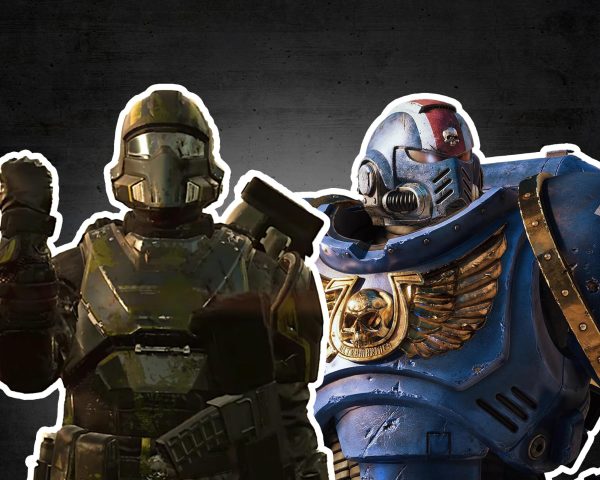
Science fiction has always been a genre of speculation, but also of reflection. For every vision of what could be, there is almost always a degree of commentary on our current world. This often takes the form of satire, especially in stories and franchises which encompass military science fiction, a subgenre which depicts the use of futuristic technology in the context of warfare.
Oftentimes, military science fiction satirizes its core premise in an attempt to offer commentary on warfare and the politics surrounding it. An example of this can be seen in the Starship Troopers franchise, whose intentionally dramatic conflict between humans and insectoid aliens is merely a backdrop for a salient commentary on fascism, wartime propaganda and the military industrial complex.
Despite its overt satirical criticism of authoritarianism and militarization, many people misinterpret the Starship Troopers franchise as an endorsement of fascism, taking its over-the-top depiction of a futuristic regime at face value rather than looking at the subtext within. This public response has since sparked an ongoing discussion about media literacy and the nature of satire — one which begs an important question: does satire need to be overt in order to be effective?
Though the Starship Troopers franchise itself is no longer as prominent as it once was, a spiritual successor can be seen in Warhammer 40,000. Created by Games Workshop, this science fantasy franchise is built around the rules and lore of a tabletop game of the same name. Set in the 41st millennium, it centers around the declining Imperium of Man, a galaxy-spanning theocratic regime whose unimaginable brutality is rivaled only by the spacefaring factions it wars against.
From its very inception, Warhammer has depicted authoritarianism in a very overt and dramatic way, much in the same way that Starship Troopers aimed to communicate to its audience that its premise wasn’t meant to be taken at face value. As time went on, however, the lore of Warhammer was expanded to a point where it started to take itself far too seriously, and the commentary it provided by virtue of its satirical dramatism became increasingly muddled.
Nowadays, Warhammer presents the actions of the Imperium as merely a fact of its grimdark setting, with human combatants facing off against such eldritch threats that the horrifying actions of the Imperium are seemingly justified within the context of its lore. As such, its outlook on the militarized theocracy it presents has become less satirical and more simply a tenet of its worldbuilding.
While I personally find the lore of Warhammer interesting, I feel that it often indulges in its grimdarkness a bit too much, with the war-torn state of the galaxy being portrayed as little more than inevitable given the horrifying actions of each faction.
Due to how Warhammer contextualizes the existence of its various factions, it has arguably lost the satirical edge that it started out with. Nowadays, it is less a satirical take on the dangers of theocratic nationalism, instead opting to prioritize the grimdark absurdity of the game it was built around.
In Warhammer there are no truly good factions — but because of how it structures its lore to explain how those evils came to be, the context for the existence of the Imperium is written more as a response to the horrors of the wider galaxy. As such, any commentary it once offered has long since been muddled by its implicit justification of its premise.
On the other hand, I believe a more recent franchise has offered a very similar satire to that of Warhammer, except far more successfully. Starting in 2015, the Helldivers game franchise has arguably provided a much more consistent satire, offering commentary on very similar themes to that of Warhammer: authoritarianism, wartime propaganda and the military industrial complex.
The franchise’s newest installment, Helldivers 2, presents a very similar premise to that of Warhammer. Much like the Imperium, Helldivers features the expansionist Super-Earth facing off against extraterrestrial threats, sardonically and humorously portraying them as a nefarious organization. Like Starship Troopers, Helldivers overtly presents the exploits of Super-Earth as unnecessary and destructive — whereas the wars fought by the Imperium have very little subtext behind the dramatism of their portrayal.
Unlike Warhammer, Helldivers makes sure to structure its lore in a way that provides context for how its setting came to be without implicitly justifying anything Super-Earth does. It is similarly overt to Warhammer, except it approaches this overtness in a more effective way. The central government of Super-Earth is written as an explicitly authoritarian regime with no regard for its citizens or the soldiers fighting its wars.
Meanwhile, the messaging it feeds both its populace is reminiscent of post-9/11 U.S. propaganda, with Super-Earth’s wars being depicted as “defense of democracy” in order to justify its actions — just as the U.S. has historically aimed to justify its imperialism and interventionism as supposedly being in defense of freedom. As for Super-Earth’s so-called “democracy,” it is intentionally written as a bureaucracy which centralizes and self-perpetuates its leaders’ power — a potential commentary on the U.S. government and how its extremely bureaucratic system of governance is far less democratic than it touts itself to be.
All in all, Warhammer and Helldivers serve as an important case study in the effectiveness of satirical writing, demonstrating that a successful satire does not necessarily need to be exclusively overt or subtle. When presenting critiques of authoritarianism and militarism, as Warhammer and Helldivers indeed do, subtext and implication are key. The most important part of a satire, in my eyes, is the relationship between its narrative and its premise — and it is essential that such a relationship be assembled carefully to avoid having a piece of storytelling inadvertently backtrack on its own allegorical themes.






















Leave a Comment